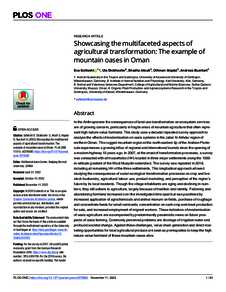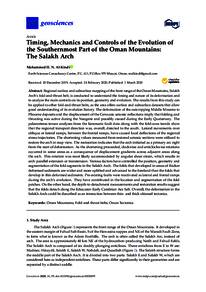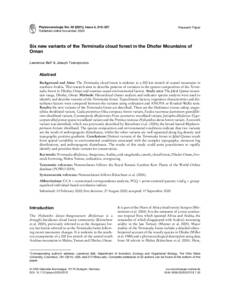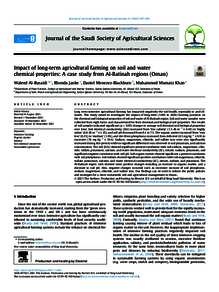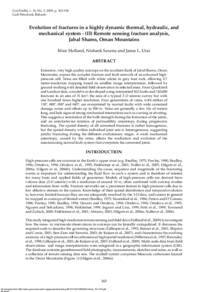Document
Showcasing the multifaceted aspects of agricultural transformation : the example of mountain oases in Oman.
Identifier
DOI: 10.1371/journal.pone.0276580
Source
PLoS ONE. v. 17, 11, e0276580
Contributors
Dickhoefer, Uta. , Author
Aloufiah, Shadha., Author
Alqaisi, Othman. , Author
Buerkert, Andreas. , Author
Country
United States.
City
California
Publisher
Public Library of Science.
Gregorian
2022-11-01
Language
English
Subject
English abstract
In the Anthropocene the consequences of land-use transformation on ecosystem services are of growing concern, particularly in fragile areas of mountain agriculture that often represent high nature-value farmland. This study uses a decadal repeated survey approach to analyse the effects of modernisation on oasis systems in the Jabal Al Akhdar region of northern Oman. This rugged mountain region at the north-eastern tip of the Arabian Peninsula experiences a growing influx of regional and international tourists since the opening of a modern highway 15 years ago. In 2007, at the onset of transformation processes, a survey was conducted with all households (HH) located in three major settlements along the 1000-m-altitude gradient of the Wadi Muaydin watershed. The survey was repeated in 2018, including all remaining HH of the three settlements. This longitudinal approach allowed studying the consequences of social-ecological transformation processes on crop and livestock husbandry, agricultural labour use, product marketing, and perception of the region’s future by its local residents. Though the village inhabitants are aging and declining in numbers, they still adhere to agriculture, largely because of tradition and identity. Fallowing and abandoning farmland increased over the investigated time span but was paralleled by increased application of agrochemicals and animal manure on fields, purchase of roughage and concentrate feeds for small ruminants, concentration on cash crop and meat production for sale, and increased employment of migrant workers. These indicators of modernisation of oasis agriculture are accompanied by predominantly pessimistic views on future prospects of oasis farming. Commonly perceived problems are shortage of irrigation water and profound societal change. Against these challenges, value chain generation and direct marketing opportunities for local agricultural produce are seen as prerequisites to keep the high nature-value farmland of these mountain oases alive.
ISSN
1932-6203
Resource URL
Category
Journal articles

